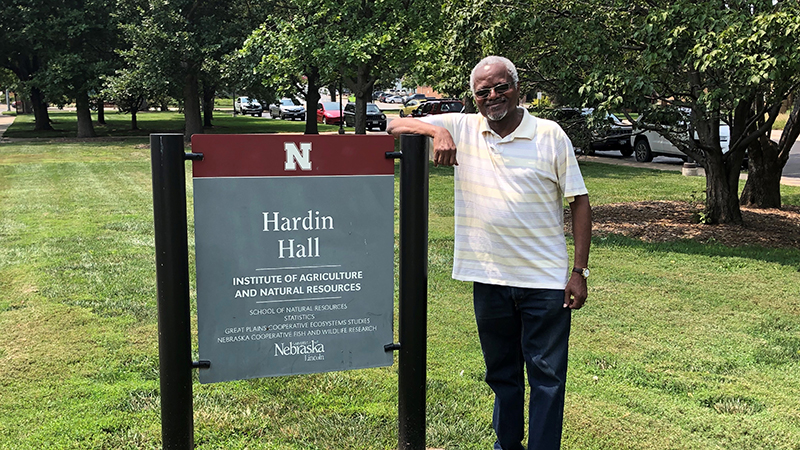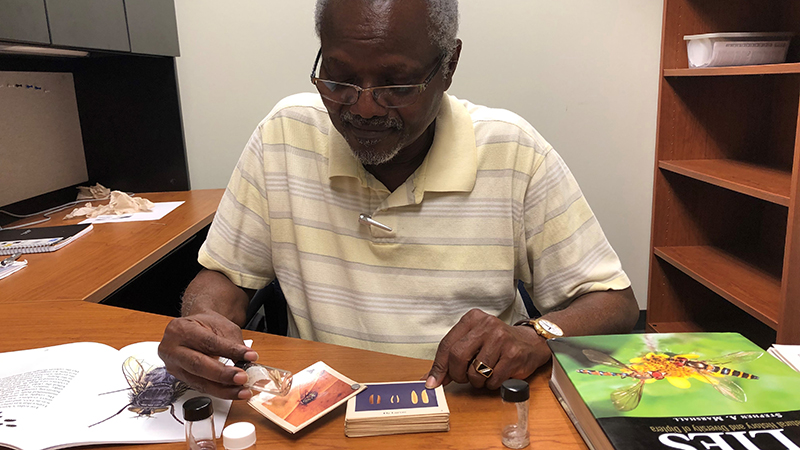Posted: 8/5/2024
Obafunwa appointed director of Nigerian Institute of Medical Research

By Ronica Stromberg
John Obafunwa, a University of Nebraska-Lincoln doctoral student, accepted an appointment as the director-general of the Nigerian Institute of Medical Research, starting July 24, 2024.
The 66-year-old was working on his doctorate in the School of Natural Resources when the president of Nigeria, Bola Tinubu, appointed him to the post. Obafunwa already held medical and law degrees and had worked as an anatomic and forensic pathologist around the world. He said in July he plans to finish his classes online and graduate in spring 2025 while also directing the institute.
"I'm looking forward to seeing what I can contribute to enhance medical research within the system, without losing sight of my aspirations or goals in terms of being in this program here," he said. "I see it, to some extent, as a kind of distraction, but let me see what I can do to make that contribution and eventually make my final exit."
As the director-general, Obafunwa now will oversee the institute’s medical units and their directors, conduct research and teach classes. He specializes in anatomic pathology, diagnosing patient diseases through laboratory work, and forensic pathology, determining cause of death of a person through examining the corpse and death site.
At Nebraska, he has been preparing his dissertation on the use of entomology and taphonomy in determining the post-mortem interval. Forensic pathologists sometimes use entomology, the study of insects and their life cycle, to help pinpoint the time of death of a body. Similarly, taphonomy, the study of how bodies decompose and fossilize, can also help in determining time of death.
Obafunwa said he had received exposure to the various specialties of forensic science while studying in the United Kingdom, but his Nebraska studies further opened his eyes.
"It's like a brain reset that certain information you have, which you now discover that that information is, to some extent in some areas, superficial," he said. "You need to now dig deep into these specialties. For that, I'm very grateful for the opportunity that I have had."
He said he sees how the research going on at the School of Natural Resources could be relevant to healthcare in many areas, such as wildlife forensics, zoonotic diseases, the nutritional value of plants and the soil best suited for those plants. He said he would like to explore whether the School of Natural Resources and National Institute of Health can form a collaboration with the Nigerian Institute of Medical Research related to healthcare.
He said he also intends in his new position to encourage students to pursue pathology as a specialty.
"I know that pathology might not be as glamorous as when you say to somebody, 'I’m a gynecologist or I’m a surgeon,'" he said. "When you say you’re a pathologist, people don't see you. You're more of a laboratory person, but you find that as a laboratory physician, you provide services for the patient. The patient does not know you, but you're there in the background, assisting, because pathology, as they say, as with radiology, pathology is the bedrock of medicine. It forms the basis for clinical diagnosis."

While the patient only sees their doctor, the pathologist is in the lab running tests and making the diagnosis. The patient’s doctor will then act on the advice of the results of the pathologist. Should the pathologist get it wrong, he or she can also be sued for medical malpractice.
"It's a big responsibility that rests on one's shoulders,” Obafunwa said.
Leon Higley, an insect ecologist in the School of Natural Resources, said he thought Obafunwa was awarded the presidential appointment based on his remarkable background in medicine and law, as well as his personal integrity and high regard in Nigeria.
"With his background in medicine and law, adding this doctorate in natural resources will make him the most overqualified forensic pathologist in the world," Higley said.
Obafunwa's illustrious career has spanned decades. He earned his medical degree from the University of Lagos in Nigeria in 1980. He then specialized in anatomic pathology, graduating in May 1987. He worked for two and a half years teaching in the university’s medical school and then earned another specialization, in forensic pathology in Scotland in 1991. He was board-certified by the Royal College of Pathologists in the United Kingdom.
He served as an anatomic pathologist and forensic pathologist in the Cayman Islands and then Bermuda. While in Bermuda, he earned a law degree by correspondence and then returned to England to work as a pathologist. There, he earned the British equivalent of a Juris Doctor degree from the university of Northumbria in 2004.
He returned to Lagos, Nigeria, to work as a professor of forensic pathology in the medical school and helped set up the second medical school in Lagos, at Lagos State University. He was elected the provost, or head, of the medical school. After serving in that position four years, he returned to the department of pathology and forensic medicine.
A year later, he was appointed the vice chancellor of Lagos State University and oversaw it for four years. He also served as the chief medical examiner and forensic pathologist for the Lagos state government, as he had when the provost. During his vice chancellorship, he contacted Nebraska and signed a memorandum of understanding to start the School of Agriculture at Lagos State University.
Obafunwa took sabbatical leave in 2016 and came to Nebraska as a visiting professor for a year. He returned to Nigeria before studying forensic imaging and virtual autopsy at the University of Zurich in 2018. He again returned to Nigeria before coming to Nebraska in January 2022 to earn his doctorate in natural resources in three years.
Once he completes his term as the director-general at the Nigerian Institute of Medical Research, Obafunwa plans to return to Lincoln to live with his family. The rest of the family moved to Lincoln in 2002, and his wife is a surgical nurse at Bryan General Hospital. His children graduated from Pius X Catholic High School and University of Nebraska and hold their own careers. All of the family members are U.S. citizens except Obafunwa. He said he is thinking of becoming a citizen upon his return and finding work to use his knowledge in entomology and taphonomy gained here.
"Whatever one is able to achieve through SNR, I would love it,” he said. “So, I still see myself as part of this family, and I still feel that at the end of the day, when I'm through with that other assignment, I can always come back and work within this environment.”